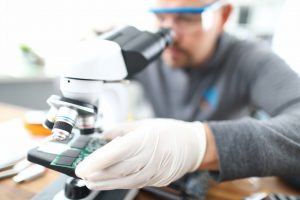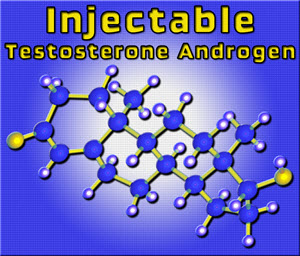 Have you ever thought about what your hormones, such as testosterone or estrogen, are actually doing in your body? They actually are involved in a lot of different processes, probably much more than you think. For example, testosterone plays a significant role in human behavior, especially male human behavior and how men respond to different scenarios in their life. Previously, scientists believed that testosterone heightens aggressive behavior (think steroids and “roid rage”) and reduces prosocial behaviors. But continuous research always seems to change things and brings new (and sometimes confusing!) data to light, and the case is no different here: now it appears that testosterone could actually enhance prosocial behaviors.
Have you ever thought about what your hormones, such as testosterone or estrogen, are actually doing in your body? They actually are involved in a lot of different processes, probably much more than you think. For example, testosterone plays a significant role in human behavior, especially male human behavior and how men respond to different scenarios in their life. Previously, scientists believed that testosterone heightens aggressive behavior (think steroids and “roid rage”) and reduces prosocial behaviors. But continuous research always seems to change things and brings new (and sometimes confusing!) data to light, and the case is no different here: now it appears that testosterone could actually enhance prosocial behaviors.
Testosterone Fosters Friendly Behavior in Males
Emory University conducted a study on testosterone and social behavior using Mongolian gerbils. They concluded that testosterone may actually have the opposite effect than what was commonly believed. It may be fostering friendly and prosocial behaviors in males. It also allowed the male gerbils to quickly change their responses to certain stimuli, depending on the social situation they were in.
 The lead study author, Aubrey Kelly, assistant professor of Psychology at Emory, states, “For what we believe is the first time, we’ve demonstrated that testosterone can directly promote nonsexual, prosocial behavior, in addition to aggression in the same individual. It’s surprising because normally we think of testosterone as increasing sexual behaviors and aggression. But we’ve shown that it can have more nuanced effects, depending on the social context.”
The lead study author, Aubrey Kelly, assistant professor of Psychology at Emory, states, “For what we believe is the first time, we’ve demonstrated that testosterone can directly promote nonsexual, prosocial behavior, in addition to aggression in the same individual. It’s surprising because normally we think of testosterone as increasing sexual behaviors and aggression. But we’ve shown that it can have more nuanced effects, depending on the social context.”
The subjects in this study were Mongolian gerbils who are known to form lasting pair bonds and raise their babies together, instead of the male leaving after the pups are born. The males, like most other male species, exhibit aggression when defending their territory as well as during the mating season. However, they will also be affectionate towards their mate with cuddling once she is pregnant and will protect the young once born.
Testosterone Promotes Cuddling and Prosocial Behaviors
 After a male and female formed a mating pair and fell pregnant, the males were injected with testosterone with the hypothesis being that the acute increase in testosterone would dampen the cuddling behavior. However, surprisingly, the males became even more cuddly and prosocial with the female. Professor Kelly described the males as becoming “like ‘super partner’”.
After a male and female formed a mating pair and fell pregnant, the males were injected with testosterone with the hypothesis being that the acute increase in testosterone would dampen the cuddling behavior. However, surprisingly, the males became even more cuddly and prosocial with the female. Professor Kelly described the males as becoming “like ‘super partner’”.
A follow-up experiment was performed and after a week the females were removed from the cage and another male gerbil was introduced. You would expect that the resident male would chase the new one, fight it or try to avoid it. Instead, the males that were injected with testosterone were actually friendly with the new male. Definitely not what one would expect!
However, with another injection of testosterone, this changed very quickly into aggressive behavior towards the intruding gerbil. Kelly explains this with her interpretation: “It appears that testosterone enhances context-appropriate behavior. It seems to play a role in amplifying the tendency to be cuddly and protective or aggressive.” Testosterone seems to help the animals rapidly switch between prosocial and antisocial behaviors as their social world changes.
Further Research Needed Regarding Testosterone and Social Behaviors
Obviously, humans are more complex than gerbils in many ways, especially in terms of behavior and thought capacity but hopefully this type of research will serve as a springboard for future research looking at hormones and social behavior. A neuroscientist at Emory, Richmond Thompson, says that “Our hormones are the same, and the parts of the brain the act upon are eve the same.”
 Thompson concludes, “Learning how hormones like testosterone help other animals adjust to rapidly changing social contexts will not only help us understand the biological nuts and bolts that affect their behavior, but also predict and ultimately understand who the same molecules in human brains help shape our own responses to the social world around us.”
Thompson concludes, “Learning how hormones like testosterone help other animals adjust to rapidly changing social contexts will not only help us understand the biological nuts and bolts that affect their behavior, but also predict and ultimately understand who the same molecules in human brains help shape our own responses to the social world around us.”
You can see how important testosterone is to men (and women!) and even animals. It impacts so many processes in our bodies and this is why it is no joke to mess around with the hormone without a doctor or endocrinologist to guide you. It is simply safer and imperative to get your testosterone from a legitimate source and allow a doctor to oversee your progress, determine your dosage and look out for side effects. And that is what we can do you for. We administer physician-monitored testosterone replacement therapy programs for men suffering from testosterone deficiency. Contact us today if you are interested in getting tested and discussing therapy options. Take control of your health now!
Reference
Contact Us Today For A Free Consultation

- Question: What Makes Men Sexy to Women? Answer: Low Stress, High Testosterone, Strong Immunity - Testosterone Therapy [Last Updated On: June 17th, 2024] [Originally Added On: February 29th, 2020]
- Low Testosterone Levels Cause Health Woes -- Testosterone Prescription [Last Updated On: May 14th, 2024] [Originally Added On: March 11th, 2020]
- Co-Sleeping with Baby Drops Men’s Testosterone Levels [Last Updated On: June 6th, 2024] [Originally Added On: March 21st, 2020]
- A Great Way to Boost Your Testosterone? Get Married! [Last Updated On: December 17th, 2023] [Originally Added On: April 1st, 2020]
- Five Myths About Low Testosterone And Testosterone Therapy — Testosterone Prescription [Last Updated On: April 29th, 2024] [Originally Added On: April 8th, 2020]
- Testosterone Reduces Group Think, Cooperation, and Less Sheep-Like Mentality [Last Updated On: August 8th, 2024] [Originally Added On: April 25th, 2020]
- Testosterone, Viagra not a winning combination for erectile dysfunction - Testosterone Prescription [Last Updated On: November 25th, 2024] [Originally Added On: April 30th, 2020]
- A Disturbing Trend: Testosterone Levels Falling Even Lower in Adolescent Males [Last Updated On: August 17th, 2024] [Originally Added On: May 31st, 2020]
- Low-T: Men With Low Testosterone Found More Likely to Die From COVID-19 AKA Coronavirus [Last Updated On: August 21st, 2024] [Originally Added On: June 12th, 2020]
- The Effects of Hypogonadism on Men and How to Fix It: Testosterone Replacement Therapy [Last Updated On: January 17th, 2024] [Originally Added On: June 14th, 2020]
- Testosterone Drives Ego, Reduces Cooperation — Testosterone Prescription [Last Updated On: February 29th, 2024] [Originally Added On: November 2nd, 2020]
- Testosterone Linked to Heart Disease -- Testosterone Prescription [Last Updated On: April 13th, 2024] [Originally Added On: November 18th, 2020]
- Acidosis: The Hidden Health Destroyer [Last Updated On: July 4th, 2024] [Originally Added On: January 20th, 2021]
- Testosterone Therapy Could Lower Diabetes Risk for Men – The Science is Promising! [Last Updated On: September 7th, 2024] [Originally Added On: February 19th, 2021]
- Who Would Have Thought? The Moon’s Cycles Affect Men’s Hormones Too! [Last Updated On: January 13th, 2024] [Originally Added On: April 23rd, 2021]
- Testosterone replacement therapy improves symptoms of metabolic syndrome - Testosterone Prescription [Last Updated On: November 24th, 2024] [Originally Added On: April 24th, 2021]
- The top ten testosterone booster supplements: A review [Last Updated On: November 12th, 2024] [Originally Added On: April 27th, 2021]
- Increase in testosterone drug use - Testosterone Prescription [Last Updated On: November 16th, 2024] [Originally Added On: April 29th, 2021]
- Men with higher testosterone tend to lie less, study suggests [Last Updated On: May 8th, 2024] [Originally Added On: April 30th, 2021]
- Environment trumps genes in testosterone levels, study finds - Testosterone Prescription [Last Updated On: November 13th, 2024] [Originally Added On: May 2nd, 2021]
- Testosterone shown to help sexually frustrated women- Testosterone Prescription [Last Updated On: November 18th, 2024] [Originally Added On: May 3rd, 2021]
- Testosterone therapy — good idea or not? - Testosterone Prescription [Last Updated On: November 24th, 2024] [Originally Added On: May 5th, 2021]
- With testosterone, it's 'my way or the highway': UK study - Testosterone Prescription [Last Updated On: November 17th, 2024] [Originally Added On: May 9th, 2021]
- Too much testosterone makes for bad decisions, tests show - Testosterone Prescription [Last Updated On: November 25th, 2024] [Originally Added On: May 10th, 2021]
- Your Life on Testosterone: Overly Sure, Unwilling to Listen to Anyone [Last Updated On: February 4th, 2024] [Originally Added On: October 17th, 2021]
- Study Investigates the Effects of Democratic Outcomes on Testosterone Levels [Last Updated On: July 26th, 2024] [Originally Added On: March 30th, 2022]
- Frustrating Factors That Suppress Testosterone Levels [Last Updated On: July 31st, 2024] [Originally Added On: July 10th, 2022]
- Guide to Boosting Your Testosterone Levels Naturally [Last Updated On: October 10th, 2024] [Originally Added On: August 16th, 2022]
- Testosterone for TRT Could Someday Be Supplied from a Single Skin Cell [Last Updated On: October 9th, 2024] [Originally Added On: September 5th, 2022]
- The Testosterone Controversy: To Take or not to Take? [Last Updated On: October 20th, 2024] [Originally Added On: November 8th, 2022]
- Think Testosterone is for Men Only? THINK AGAIN! [Last Updated On: October 14th, 2024] [Originally Added On: November 16th, 2022]
- Testosterone Recruits Immune Cells That Fight Cancer [Last Updated On: September 4th, 2024] [Originally Added On: November 22nd, 2022]
- Kevin Nash Defends The Rock’s PED Use after Joe Rogan’s Comments [Last Updated On: November 1st, 2024] [Originally Added On: December 15th, 2022]
Word Count: 767




















